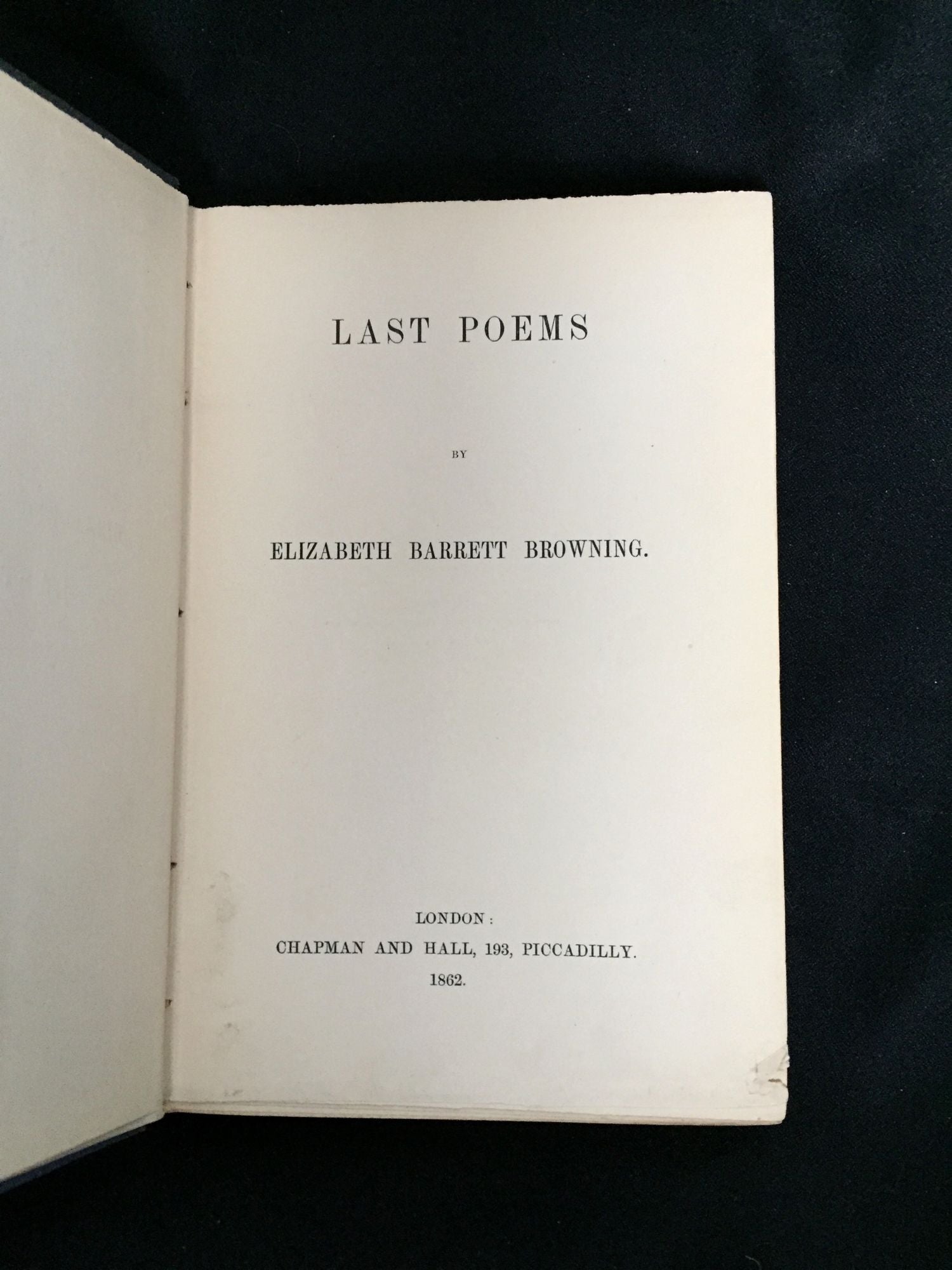
LAST POEMS Elizabeth Barrett Browning First Edition
Point her to the starry skies, Guard her, by your truthful words, Pure from courtship's flatteries. By your truth she shall be true —. Ever true, as wives of yore —. And her Yes, once said to you, SHALL be Yes for evermore. Elizabeth Barrett Browning, "The Lady's Yes" from Poems. London: Edward Moxon, 1844.
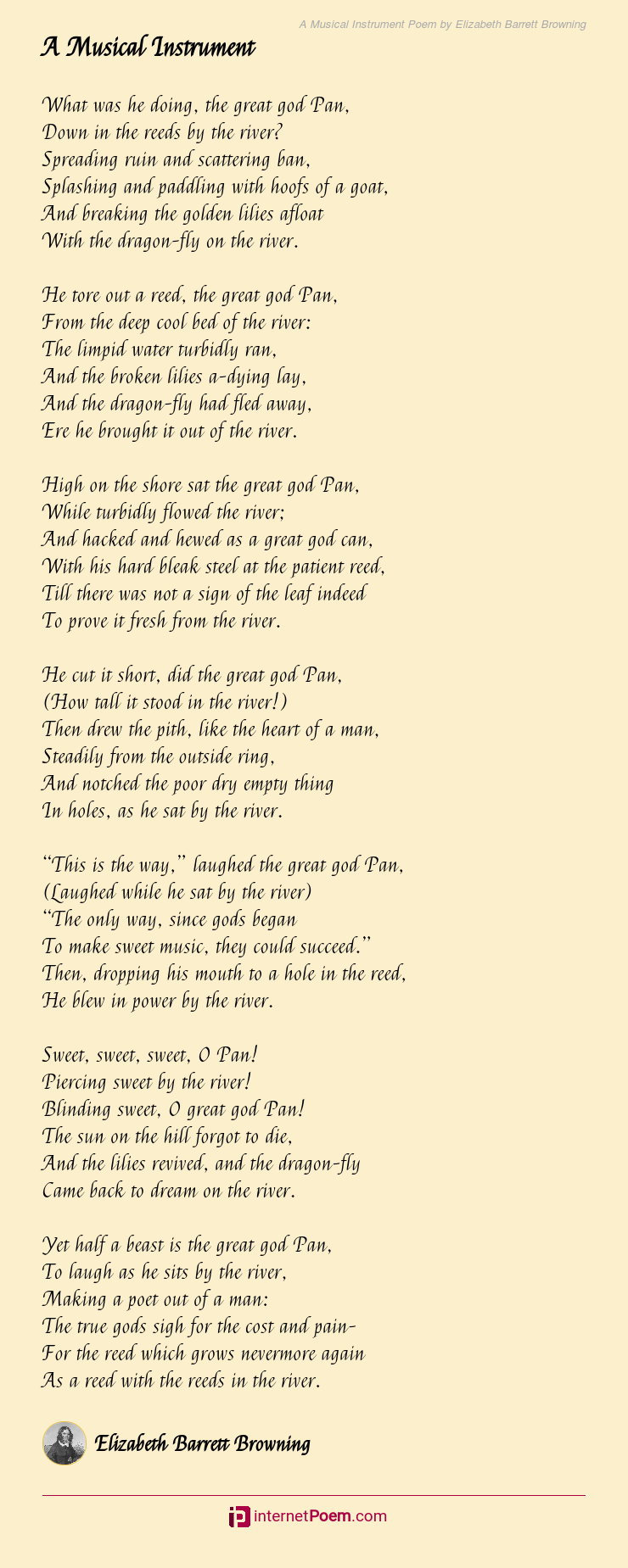
A Musical Instrument Poem by Elizabeth Barrett Browning
Here are some of her very best poems. ' The Runaway Slave at Pilgrim's Point '. As well as writing some of the most famous love poetry of the Victorian era (see below), Elizabeth Barrett Browning also explored and tackled social issues in her poetry. In this poem, a dramatic monologue, she writes in the character of a black female slave.

Irreparableness Poem by Elizabeth Barrett Browning
Let me count the ways" is a sonnet by the 19th-century poet Elizabeth Barrett Browning. It is her most famous and best-loved poem, having first appeared as sonnet 43 in her collection Sonnets from the Portuguese (1850). Although the poem is traditionally interpreted as a love sonnet from Elizabeth Barrett Browning to her husband, the poet.

A4 Size Parchment Poster Classic Poem Elizabeth Barrett Browning How Do I Love Thee Poems
Elizabeth Barrett Browning. Born on March 6, 1806, at Coxhoe Hall, Durham, England, Elizabeth Barrett Browning was an English poet of the Romantic Movement. The oldest of twelve children, Elizabeth was the first in her family born in England in over two hundred years. For centuries, the Barrett family, who were part Creole, had lived in Jamaica.
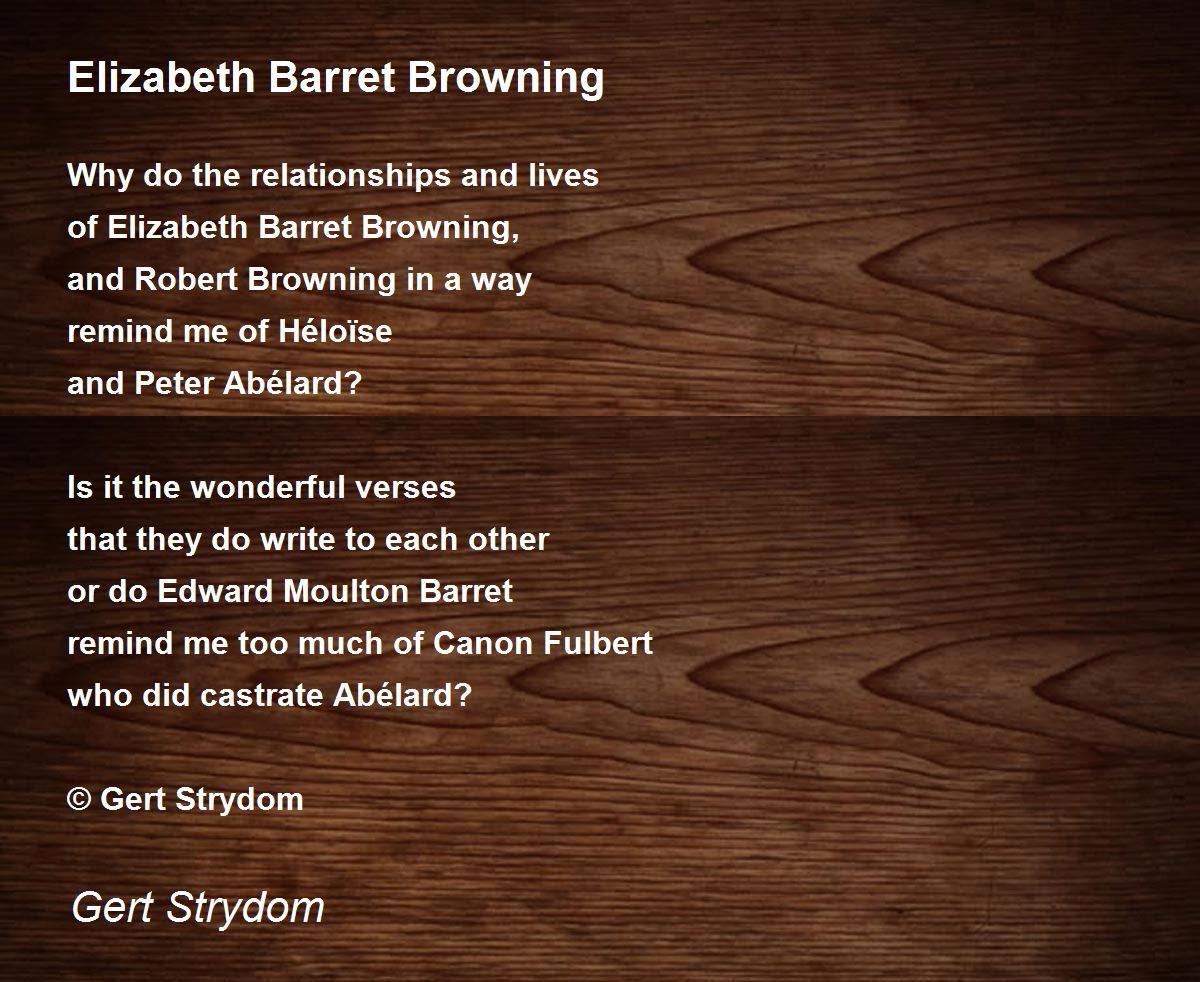
Elizabeth Barret Browning Elizabeth Barret Browning Poem by Gert Strydom
Of the absolute heavens. Deep-hearted man, express. Grief for thy dead in silence like to death—. Most like a monumental statue set. In everlasting watch and moveless woe. Till itself crumble to the dust beneath. Touch it; the marble eyelids are not wet: If it could weep, it could arise and go. I tell you, hopeless grief is passionless;

Verses In Vox "The Best Thing in the World" by Elizabeth Barrett Browning
Elizabeth Barrett Browning died in her husband's arms in 1861. Last Poems was published posthumously and included 'A Musical Instrument'. It is deceptively simple: the great God Pan, 'Spreading Ruin and scattering ban' is a destructive as well as a creative force: he makes music by doing damage. It is as though this nineteenth-century.
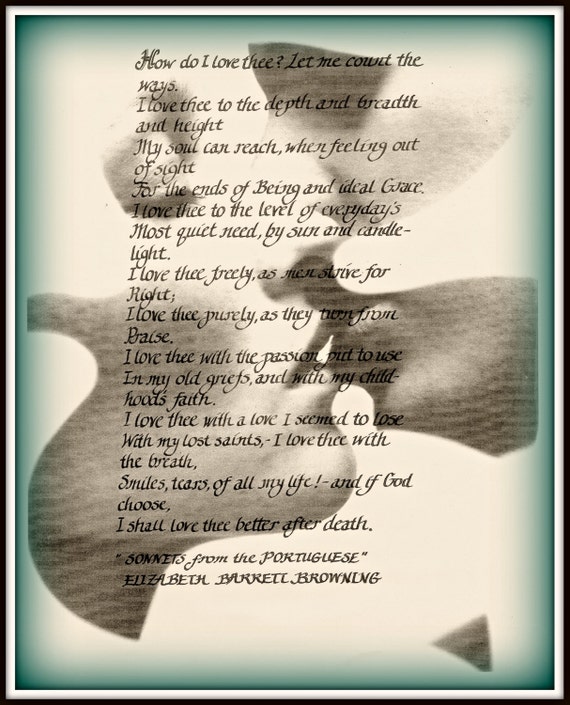
Love Poem Elizabeth Barrett Browning 8 X 10 by MuzettasWaltz
Do not say, "I love her for her smile—her look—her way. Of speaking gently,— ". Barrett Browning's long narrative poem Aurora Leigh is the story of the eponymous heroine's life, and is.
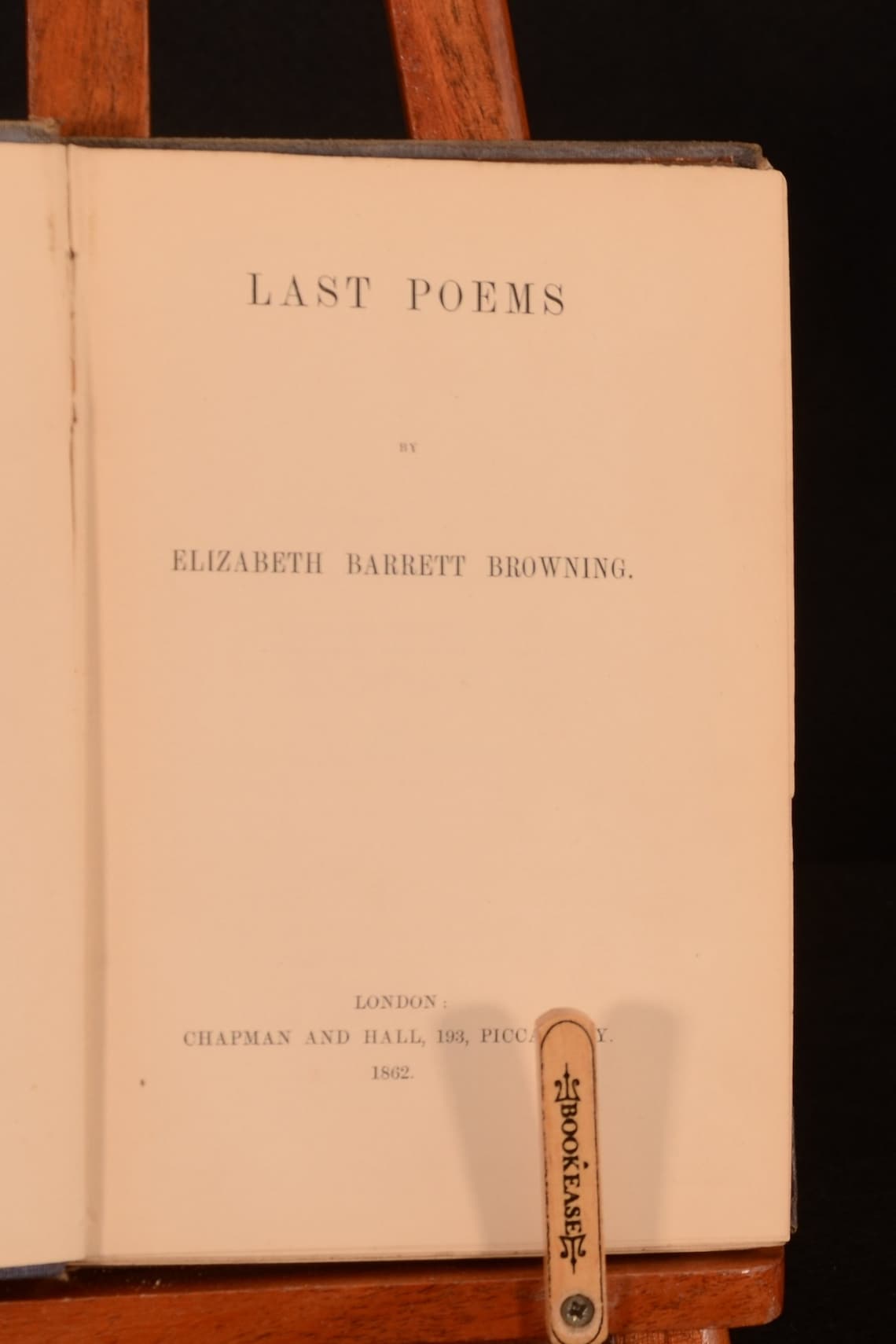
1862 Last Poems Elizabeth Barrett Browning First Edition C. E. Etsy
Poem Analyzed by Emma Baldwin. B.A. English (Minor: Creative Writing), B.F.A. Fine Art, B.A. Art Histories. 'My Heart and I' is a dark poem in which Browning depicts the distress a newly widowed woman goes through after the death of her husband in the 19th century. During this period, women were seen as an extension of the men they married.

How Do I Love Thee? Let me Count the Ways by Elizabeth Barrett Browning Quotes Pinterest
Elizabeth Barrett Browning's 10 best poems. Ten great works by the poet Elizabeth Barrett Browning, whose life is commemorated in a Google Doodle. By Frances Wilson 06 March 2014 • 2:29pm .
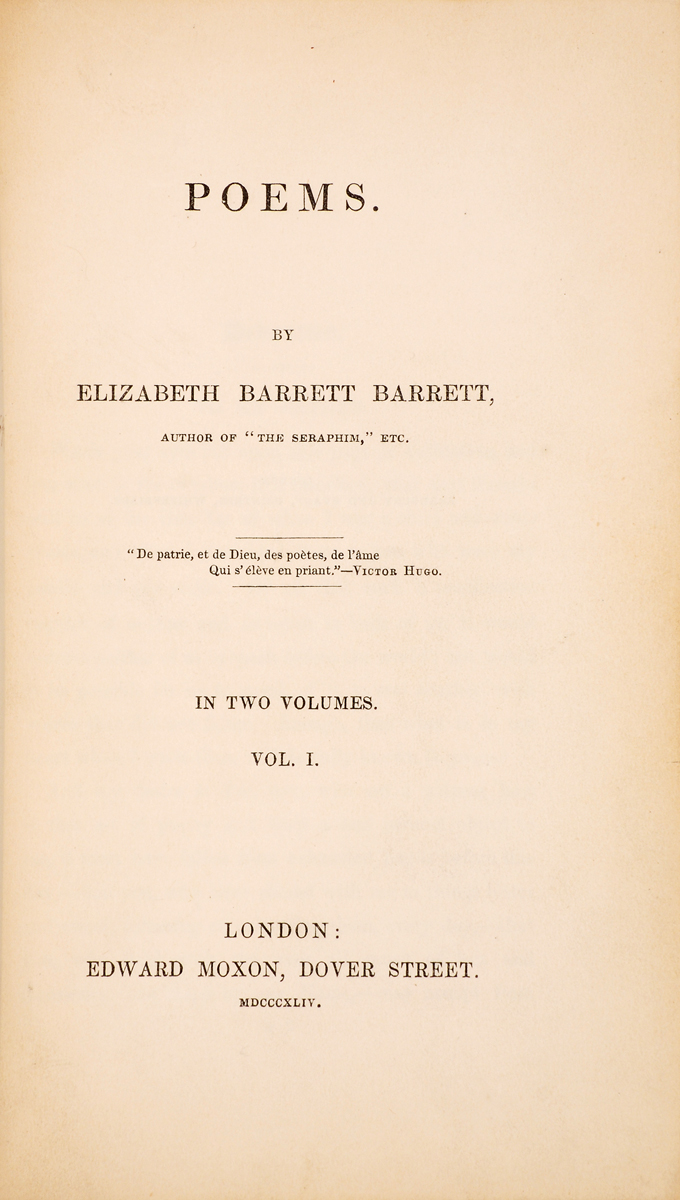
Browning Poems inscribed by Elizabeth BarrettThe 19th Century Rare Book and Photograph Shop
Elizabeth Barrett Browning (born March 6, 1806, near Durham, Durham county, England—died June 29, 1861, Florence, Italy) was an English poet whose reputation rests chiefly upon her love poems, Sonnets from the Portuguese and Aurora Leigh, the latter now considered an early feminist text.Her husband was Robert Browning.. Elizabeth was the eldest child of Edward Barrett Moulton (later Edward.

Lovely Love quotes for her, Elizabeth barrett browning,
By Elizabeth Barrett Browning. We cannot live, except thus mutually. We alternate, aware or unaware, The reflex act of life: and when we bear. Our virtue onward most impulsively, Most full of invocation, and to be. Most instantly compellant, certes, there. We live most life, whoever breathes most air. And counts his dying years by sun and sea.
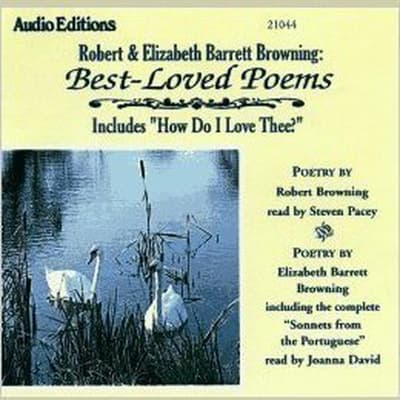
Robert and Elizabeth Barrett Browning BestLoved Poems Audiobook, written by Robert Browning
Elizabeth Barrett Browning's life reads like the kind of mid-1930s Hollywood melodrama that it eventually was. Born in 1806 to Edward Barrett Moulton Barrett and Mary Graham-Clarke, Elizabeth Barrett was the oldest of 12 children, 11 of whom survived to adulthood.. She is the author of one of the most famous poems in the English language.
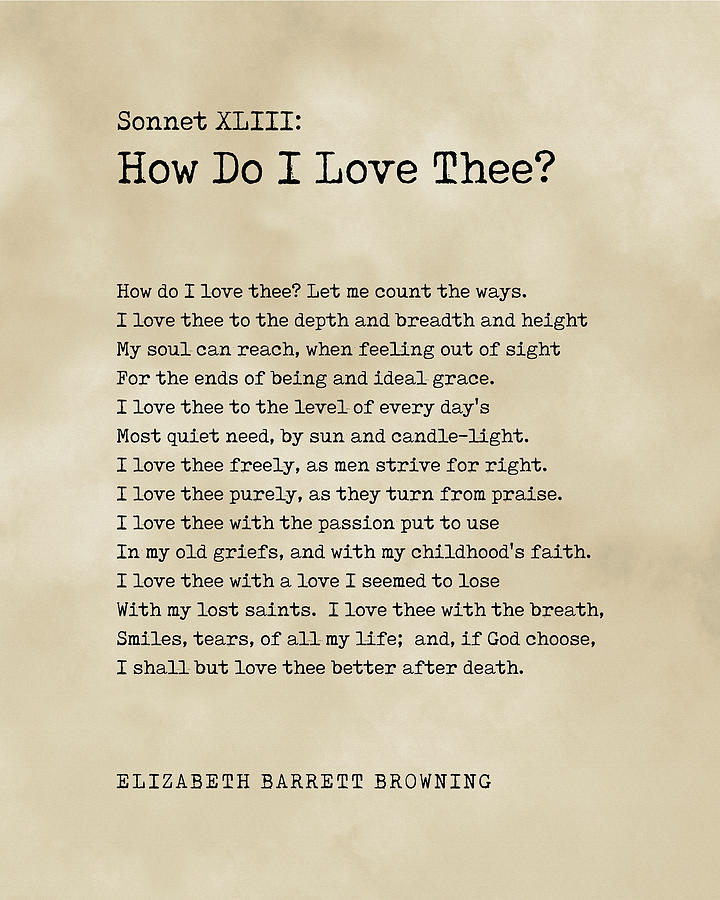
How Do I Love Thee? Elizabeth Barrett Browning Poem Literature Typewriter Print Vintage
Elizabeth Barrett Browning. 1806-1861. Engraving from original Painting by Chappel, 1872. (Photo by: Universal History Archive/Universal Images Group via Getty Images) Among all female poets of the English-speaking world in the 19th century, none was held in higher critical esteem or was more admired for the independence and courage of her.

E. B. Browning, Grief
Elizabeth Barrett Browning was a renowned Victorian poet married to fellow writer Robert Browning, celebrated for her influential work that resonated with contemporaries like Emily Dickinson and Edgar Allan Poe.. She gained early recognition with the publication of 'Poems' in 1844 and was even considered for the title of poet laureate alongside Tennyson.

To Flush, My Dog Poem by Elizabeth Barrett Browning
59. Sonnet 26 - I lived with visions for my company. 60. Sonnet 39 - Because thou hast the power and own'st the grace. 61. Sonnet 24 - Let the world's sharpness, like a clasping knife. 62. Pain In Pleasure. 63.

Change Upon Change Poem by Elizabeth Barrett Browning
Elizabeth Barrett Browning's exciting and excited sonnet takes part in the centuries-old tradition of amorous sonnets and sonnet sequences (as old as the sonnet form, as Dante and Petrarch), but also draws on the new Victorian kind of poem called the dramatic monologue, which her husband Robert Browning helped to invent. In dramatic monologue a single character's speech, depicted in real.
- The Flash Movie Streaming Australia
- What Is Permanent Account Number
- Support Act For Paul Mccartney
- Weather In Albany Creek 10 Days
- Mrs Fields Cookies Store Locator
- What Is A Student Advisory Committee
- 200 Series Vx Landcruiser For Sale
- Cast Of When The Daltons Rode
- Royal Show 2023 Show Bags
- Tea Tree Gully Football Club